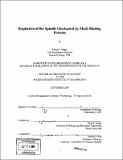Regulation of the spindle checkpoint by Mad2 binding proteins
Author(s)
Hagan, Robert S
DownloadFull printable version (27.75Mb)
Other Contributors
Massachusetts Institute of Technology. Dept. of Biology.
Advisor
Peter K. Sorger.
Terms of use
Metadata
Show full item recordAbstract
The spindle checkpoint ensures the fidelity of chromosome segregation by delaying anaphase until all sister chromatids form proper bipolar attachments to the mitotic spindle. Spindle checkpoint proteins localize to unattached or maloriented kinetochores in mitosis and generate a signal that prevents dissolution of sister chromatid cohesion. Checkpoint signaling requires binding of Mad2 to the checkpoint protein Madl and Cdc20, a subunit of the Anaphase Promoting Complex. We have characterized the interactions of human Mad2 with Madl, Cdc20, and CMT2, a checkpoint inhibitor. Cdc20 and Madl form competitive high affinity complexes through contacts in the peptide binding cleft of Mad2, while CMT2 binds noncompetitively to the closed conformation of the Mad2 C-terminus. I propose a model by which conformation- specific binding of CMT2 silences Mad2 signal generation. The requirement for active checkpoint inhibition in mitosis is not known. We examined the role of CMT2 in mitosis by fixed- and live-cell microscopy. CMT2 localizes to kinetochores in a Mad2-dependent manner and forms ternary complexes with Madl-Mad2 and Cdc20-Mad2 in vivo. Surprisingly, CMT2 is required for completion of mitosis even in the absence of spindle damage. (cont.) I show that CMT2 opposes Mad2 function at kinetochores and in the cytosol and propose that active silencing of the Mad2- dependent checkpoint is required for completion of mammalian mitosis.
Description
Thesis (Ph. D.)--Massachusetts Institute of Technology, Dept. of Biology, 2005. Includes bibliographical references.
Date issued
2005Department
Massachusetts Institute of Technology. Department of BiologyPublisher
Massachusetts Institute of Technology
Keywords
Biology.